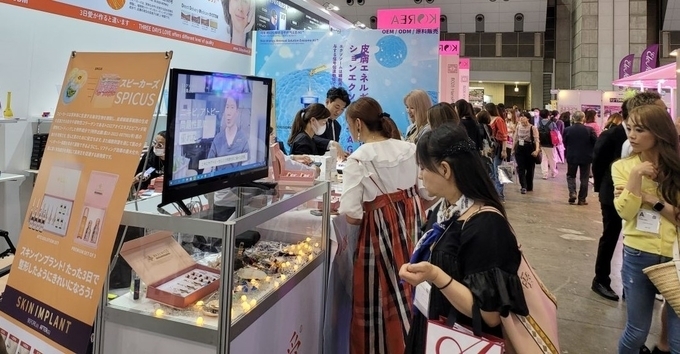KOTRA Nagoya Office Report

Japan's Generation Z, called 'digital natives'. One of the terms used to describe them is 'Taipa', an abbreviation for 'Time Performance'.
Previously, the term 'Cospa' (Cost Performance), which has the same meaning as 'cost performance' used in Korea, was popular, but now Taipa, which indicates efficient use of time, has emerged.
According to a survey conducted by Shibuya 109 Lab on 400 Japanese Gen Z men and women, 85% of them gave an answer that they watch videos while attaching importance to Taipa.
The Japanese video advertising market in 2022 was 560.1 billion yen, up 33.2% from the previous year. This can be seen as a phenomenon following the rise of △YouTube shorts video △Instagram reels function △TikTok.
What they all have in common is an SNS tool that can share information through short videos, and Generation Z is performing various activities such as communicating with acquaintances and obtaining information necessary for life through these media.
It is analyzed that the popularity of shorts videos, release functions, and TikTok reflects the tendency of Generation Z, who have a difficult sense of time, to increase their knowledge or use it as a basis for judgment by accessing various information with high efficiency in a short time.
Since these short videos provide an opportunity for Generation Z to view product and service information without any burden, companies are focusing their efforts on promotions using short videos. At the same time, seminars on marketing using short videos are on the rise.
The latest report by KOTRA, Japan's Nagoya Office, analyzed that the change in the purchasing pattern of Japan's Generation Z is largely attributable to the 4th Korean Wave and their tendency to pursue efficient use of time. In particular, it is worth paying attention to the fact that the new trend of K-beauty, which began to emerge in the second half of last year, is also contributing to the purchasing power of the Z generation.
Generation Z purchasing pattern trends
Generation Z, who prioritizes time efficiency, shows a different purchasing pattern than previous generations. When making a purchase, they tend to take time to review whether it is really worth buying, and they are also interested in social issues such as the environment and discrimination. Consider whether the product has not only functional value but also emotional value that satisfies the mind.
According to a survey conducted by Ecbeing on 69 university students aged 18 to 25 in March this year, Gen Z tends not to make impulse purchases.
79.4% of Generation Z consumers responded that they did not buy △ I do not make impulse purchases. The reasons they do not purchase are △ Anxiety about not getting detailed information △ Trying not to accept advertisement information as it is △ A product without reviews from others lacks reliability △ I want to judge whether it is right for me by looking at word of mouth or comparison videos A response also came out.
As a result of a survey of media referred to when purchasing, 90.6% were Instagram. In particular, in the case of cosmetics or fashion items, 31.7% and 23.3% of respondents said that they read Instagram before buying, respectively.
Generation Z users not only use the Instagram hashtag feature, but also understand the algorithm that recommends products that are closely related to the products they 'like'. Some young consumers use this characteristic to create multiple accounts to prevent biased products from being displayed, and to like different products to display a wide range of products.
Generation Z, who are trying to find something that suits them based on efficiency, often gets information from YouTube or Instagram of influencers similar to their characteristics, and they check the posts of several people rather than one person to make a choice that is more suitable for them. There are many people.
Changes in means of search and the Korean wave found in them
In the past, if you have any questions, the mainstream method was to use a search engine such as Yahoo Japan or Google to find out. However, in recent years, there is a growing trend of using SNS, especially among young women, to find information on products they are interested in.
According to the results of a survey of women in their 20s announced by MarkeZine in July 2021, to the question 'What platform do you search on several times a day?' People accounted for about 30% and showed a higher usage rate than search engine services.
CCCMK Holdings and Shibuya 109 Lab's consumer behavior survey results of Generation Z women confirm that they are highly dependent on SNS when purchasing cosmetics or fashion items.
It shows a tendency to lead to purchase while experiencing the steps of awareness → interest → search → sharing of products and services almost simultaneously and in random order, while quickly encountering friends’ contributions, influencers, or word of mouth on social media.
Generation Z's use of social media and the Korean Wave
Keywords related to Korea stand out in the popular hashtags of 2022 on Instagram, which is used as one of the search methods for Generation Z.
The fashion term '#OOTD' (abbreviation for Outfit Of The Day. It means today's outfit, today's fashion), ranked 3rd in popular hashtags, is written in Korean as '#OOTD' and used by many young people. Furthermore, '#Like' is also ranked in the TOP 100.
'#Korean Fashion' and '#Korean Hair' also rose in the rankings, proving that Japan's Generation Z is interested in Korea and uses Korean culture as a daily routine when expressing themselves by accepting it.
It is also interesting to note that Korean culture has become an indispensable presence for trend-conscious Generation Z. Music, fashion, makeup, and hair styles are having a great impact on the overall culture, and the expression 'Korean-like' is replacing the expression 'cool'.
There are many opinions about the popularity of Korean culture, but they mainly mention that the characteristics of Hallyu contents and the social background of Japan are intertwined and spreading.
The COVID-19 pandemic eventually led to an expansion of demand for 'leisure that can be enjoyed at home' in Japan. The 4th Hallyu boom occurred as hits such as the drama 'Crash Landing on You', the movie 'Parasite', and the idol group Espa became hits.
In addition to these social and cultural backgrounds, Korea's unique way of spreading cultural content also had an impact. K-pop is characterized by being easily enjoyed as free content on YouTube and SNS. As a voluntary activity of fans, they share artists' events, live performances, airport photos, etc. on SNS.
Although fans' activities are unofficial, they are of high quality, so they affect the artist's reputation and popularity. For this reason, agencies sometimes invite fans to live performances, press conferences, or events. It means that a lot of content that allows free access to artists is released, and an environment is created where people who want to know more about the field can easily start fan activities.
The fashion the artist wears, the accessories he wears, and the makeup or hairstyle naturally spreads through social media. The attention of the younger generation in Japan is focused and they recognize that Korean trends are cool and sophisticated.
Using these sophisticated trends, Japanese Gen Z often express themselves. A recent trend that has been increasing is to upload photos or videos that tell you △ what kind of atmosphere I like △ what kind of style I like. At this time, they give a sense of unity to all the content they post or work to match their worldview.
In addition, Korean culture was combined to create images using Korean expressions such as △ 97 LINE △ the youngest line or poses such as Gyarupis (a pose that became explosively popular via Korea while K-pop idol group IVE Lay was filming). They are trying to capture their true self while using their refined senses.
Catch Generation Z, deeply immersed in Korean culture, through social media
Generation Z has a strong desire to find the best choice for them based on the efficiency of their time. Therefore, when marketing with young customers who want to find the right answer from a lot of information in mind, it is important to disseminate short videos that explain how to use the product or to make the reviews of influencers as well as the general public available in Japanese. can be a point.
As can be seen from popular hashtags on Instagram, Japan's Generation Z is already deeply immersed in Korean culture. According to a person in charge of company A, a consumer goods retailer, “The younger generation in Japan has no objection to the act of incorporating knowledge of Korean culture into their daily lives and even uploading it. From this point of view, the use of social media can be said to be the most effective strategy for Japanese generation Z.” <Organization and Cosmorning editorial office>







